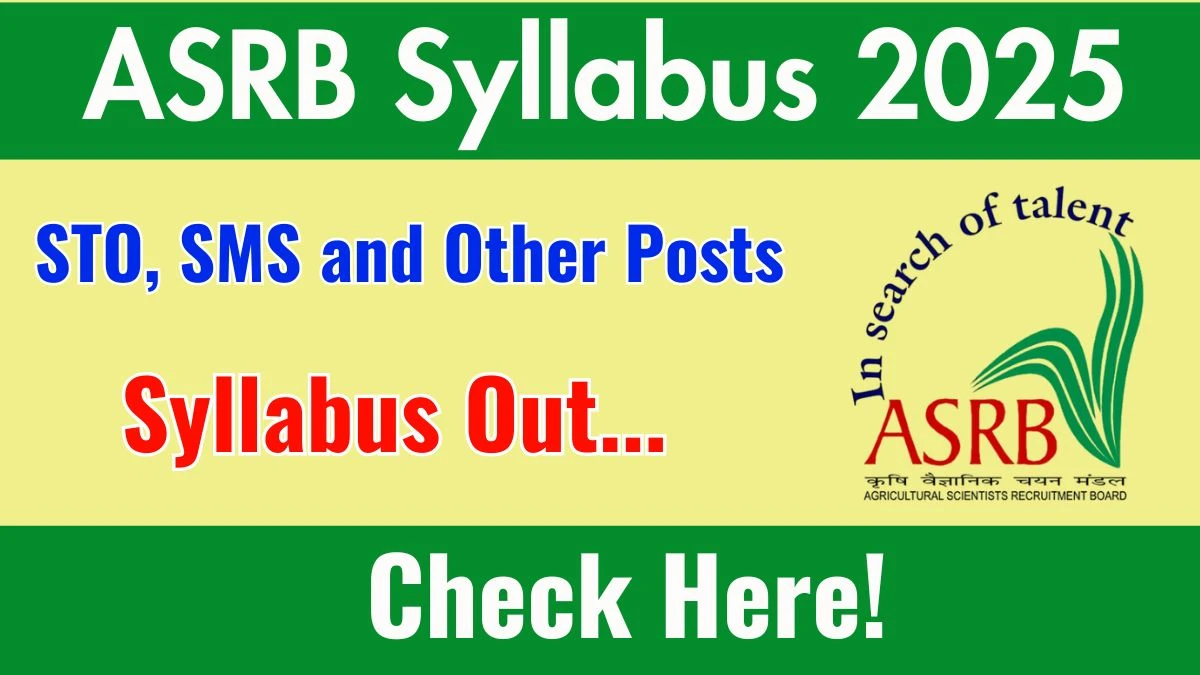ASRB NET Syllabus 2025 Overview
The Agricultural Scientists Recruitment Board (ASRB) has published the official syllabus and exam pattern for the NET recruitment exam. To ensure a well-structured study plan, candidates aiming for the ASRB NET exam should thoroughly review both sections of the syllabus. Understanding the detailed syllabus and exam structure is essential for effective preparation.
| Exam Name | ASRB NET Recruitment |
| Conducting Authority | Agricultural Scientists Recruitment Board (ASRB) |
| Post Name | Agricultural Research Service (ARS), Subject Matter Specialist (SMS) (T-6), Senior Technical Officer (STO) (T-6) |
| Number of Vacancies | 582 |
| Selection Process |
|
| No.of Questions | 150 |
| Duration | 2 hours |
| Total Marks | 150 |
| Negative Marking | 1/3 Negative Mark |
| Official Website | asrb.org.in |
ASRB NET Syllabus 2025
The syllabus is an important part of your exam preparation. It lists all the topics you need to study, helping you focus on what’s important. To do well in the ASRB NET exam 2025, make sure you understand the syllabus fully. It covers both general subjects and specific topics related to the post. Use the syllabus to guide your studies and ensure you're covering everything needed for the exam.
| Subject | Topics Covered |
|---|---|
| Agricultural Biotechnology |
|
| Agricultural Entomology |
|
| Agricultural Microbiology |
|
| Genetics & Plant Breeding |
|
| Plant Pathology |
|
| Animal Nutrition |
|
| Soil Science |
|
| Agricultural Economics |
|
| Fisheries Science |
|
| Food Technology |
|
| Bioinformatics |
|
ASRB NET Job Overview
|
Agricultural Scientists Recruitment Board (ASRB) SMS, STO Vacancies 2025 |
||
|
Application Fee
|
||
ASRB Recruitment 2025 Important Dates
|
||
ASRB Recruitment 2025 Age Limit
|
||
ASRB Recruitment 2025 Vacancy Details |
||
| Post Name | Total | Qualification |
| Agricultural Research Service (ARS) | 458 | Ph.D (Relevant Filed) |
| Subject Matter Specialist (SMS) (T-6) | 41 | Master’s Degree (Relevant Filed) |
| Senior Technical Officer (STO) (T-6) | 83 | Master’s Degree (Relevant Filed) |
| Interested Candidates Can Read the Full Notification Before Apply Online | ||
| Important Links | ||
| Apply Online | Click Here | |
| Notification | Click Here | |
| Official Website | Click Here | |
| Join Telegram Channel | Click Here | |
| Download Mobile App | Click Here | |
| Join WhatsApp Channel | Click Here | |
Download ASRB NET Syllabus PDF
Aspirants can access the detailed ASRB NET Syllabus PDF to get a clear overview of all the topics essential for the exam.
Click Here - ASRB NET Syllabus PDF
ASRB NET Exam Preparation Tips
To prepare effectively for the ASRB NET exam, candidates should follow these commonly recommended preparation tips:
- Understand the Exam Pattern and Syllabus - Review the syllabus and exam pattern to plan effectively.
- Create a Study Schedule - Organize your study time for both General and Nursing subjects.
- Refer to the Best Study Materials - Use recommended books and resources for each subject.
- Practice Regularly - Solve practice papers and previous year’s questions to improve your skills.
- Focus on Conceptual Clarity - Focus on understanding core concepts, not just memorization.
- Improve Speed and Accuracy - Practice answering questions quickly and accurately.
- Stay Updated with Current Affairs - Read newspapers and follow online resources for current events.
- Maintain a Healthy Lifestyle - Eat well, stay hydrated, and take regular breaks.
- Revision is Key - Regularly revise topics to ensure better retention.
- Stay Positive and Motivated - Stay confident and motivated throughout your preparation.
| Jobs In Delhi | ||
|---|---|---|
| Alwar Delhi | Bahadurgarh | Ballabgarh |
| Bhiwadi | Bhiwani Delhi | Faridabad Delhi |
| Ghaziabad Delhi | Gurgaon Delhi | Kundli CharkhiDadri |
| Loni | Manesar | New Delhi |
| Noida Delhi | Sonepat Delhi | |

